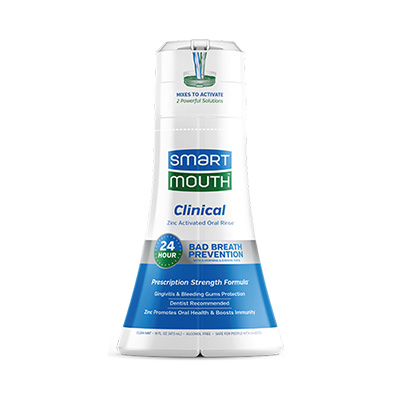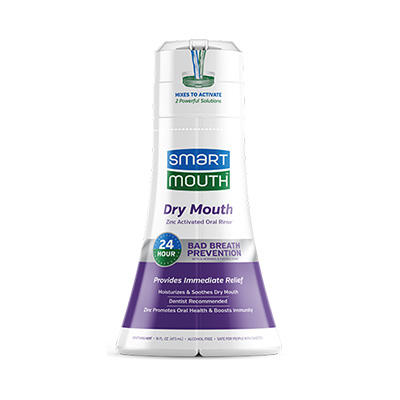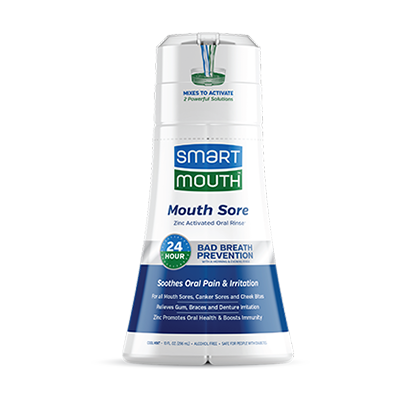Chronic Bad Breath: Symptoms and Treatment Options
Chronic bad breath — the kind that persists over time — is different than just waking up with smelly breath in the morning or having bad breath after you drink a cup of coffee. Living with chronic bad breath, also known as halitosis, can negatively impact your quality of life and prove to be a challenge in social and professional settings.
Continue reading to better understand what chronic bad breath is and how to manage it.
Chronic Bad Breath vs. Acute Bad Breath — What’s The Difference?
What’s the difference between chronic bad breath and the occasional instance of funky breath? If you’re wondering about this question, don’t worry — you’re not alone.
The fact is, we all experience different degrees of bad breath at one point or another. For example, bad breath is a common occurrence after drinking coffee or eating garlic. Chronic bad breath, however, is a more pressing concern that affects many people across the globe.
What’s The Definition of Chronic Bad Breath?
Chronic bad breath is defined as an ongoing case of bad breath, no matter how much you brush and floss your teeth or rinse with mouthwash.
Chronic bad breath can make your work relationships, social life, and love life very difficult at times because you and others around you may want to avoid up-close-and-personal contact.
If you experience any of the following daily symptoms, you may want to speak to a dentist about chronic bad breath.
- A constant sour or metallic taste in your mouth
- Plaque build-up near the base of your teeth or between teeth
- A burning sensation on your tongue
- Puffy or bleeding gums
- Bad breath that doesn’t go away after brushing
- Postnasal drip
- An unnatural amount of mucus
- Dry mouth
- A white tint or coating on your tongue
- Thick saliva
- People avoiding close contact and/or turning away when you speak
If you or someone you know is worried about chronic bad breath — and its effect on self-esteem — it’s best to consult a dentist or dental hygienist to discuss a plan for proper oral health.
How to Know If You Have Chronic Bad Breath
Sure, chronic bad breath can be embarrassing, but it doesn’t have to ruin your self-confidence. The fact is, our noses aren’t trained to pick up our own smelly breath, so it can be somewhat difficult to know if you do or do not have bad breath at any given time.
With that said, there are a few easy steps to take to determine if you have bad breath.
- Floss your teeth, then sniff your floss after you’ve finished.
- Ask someone you trust if they notice a foul smell when you breathe in their vicinity.
- Wipe the back of your tongue with a cotton ball and then smell it.
- Discuss your oral health and hygiene with your dentist or dental hygienist.
Causes of Chronic Bad Breath
There isn’t one root cause of chronic bad breath. Whether or not you experience persistent or occasional bad breath is purely dependent on your overall health and lifestyle choices.
The most prevalent cause of chronic bad breath is poor oral hygiene. More specifically, bad breath occurs when oral bacteria consume protein and produce volatile sulfur compounds (VSCs).
Causes of acute or temporary bad breath may include:
- Eating foods high in sugar, protein, and/or acid
- Drinking beverages high in caffeine and/or sugar
- Smoking tobacco
- Chewing tobacco
- Engaging in recreational drug use
- Consuming alcohol
- Having poor oral hygiene
Chronic bad breath can originate in your mouth, but it can also be caused or worsened by other conditions. Causes of chronic bad breath include:
- Smoking tobacco
- Chewing tobacco
- Eating a high-protein diet (such as the keto diet)
- Engaging in recreational drug use
- Taking certain over-the-counter or prescription medications
- Periodontal disease or tooth decay
- Respiratory conditions or infections such as:
- Sinus infection or sinusitis
- Bronchitis
- The Flu
- Pneumonia
- Asthma
- Postnasal drip
- Tonsillitis or tonsil stones
- Digestive disorders
- Diabetes or kidney disorders
- Liver disorders
Additionally, dry mouth can be one of the leading causes of halitosis because saliva production helps maintain proper oral health. Not only does it keep our mouths comfortable, but it also removes food particles so unwanted bacteria can’t feed and produce stinky sulfur gas — known as VSCs — in their digestion process.
It’s important to consult your doctor if you’re taking medications that cause dry mouth or chronic bad breath symptoms. Beyond bad breath, consistent dry mouth can lead to tooth decay, cavities, and gum disease. Discuss alternative drug options with your healthcare provider to see if you can find a solution that does not cause dry mouth.
Treatment and Prevention for Chronic Bad Breath
Having a good oral routine and overall healthy lifestyle is vital when it comes to having a healthy mouth and fresh breath.
If the cause of your chronic bad breath originates in your mouth, talk to your dentist and follow the simple DIY solutions below.
- Eliminate or reduce stinky foods, such as onions, garlic, and fish, from your diet
- Start eating more high-fiber foods
- Try to eat less dairy
- Consume less high-protein meats
- Drink more water
- Quit drinking beverages that contain sugar
- Eliminate caffeinated drinks from your diet
- Quit smoking cigarettes or cigars as well as chewing tobacco
- Chew sugar-free gum or mints
- Brush, floss, and use mouthwash after every meal
- Clean your tongue daily
Can Mouthwash or Flossing Help?
It’s very important to note that there is no available mouthwash, toothpaste, or oral health product that can cure or eliminate chronic bad breath permanently. To help prevent and manage bad breath, it’s critical to maintain proper oral hygiene and visit your dentist regularly for cleanings.
Oral health practices known to reduce persistent bad breath include:
- Brushing at least twice a day
- Rinsing with an alcohol-free mouthwash as needed
- Flossing every time you brush
- Thoroughly cleaning your tongue every time you brush
Regular discussions with your dentist can help you adjust and improve your oral health plan.
Conclusion
Chronic bad breath can be caused by a variety of factors including poor oral hygiene, tobacco use, and gum disease. Depending on the root cause of your bad breath, you and your dentist can explore different remedies for a cleaner mouth and fresher breath. For example, brushing, flossing, and using an alcohol-free mouthwash can all benefit people suffering from chronic bad breath due to poor oral hygiene. Be sure to speak with your dentist to choose the right course of action for you.
Sign up today for coupons, offers and updates!
At SmartMouth, we love saving you from bad breath, but we also love saving you money.






